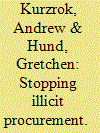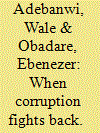|
|
|
Sort Order |
|
|
|
Items / Page
|
|
|
|
|
|
|
| Srl | Item |
| 1 |
ID:
131599


|
|
|
|
|
| Publication |
2014.
|
| Summary/Abstract |
A Hollywood, Florida, conference of specialists in preventing, detecting, and responding to money laundering might not seem to be the most likely spot for the next innovation in nuclear nonproliferation policymaking. Yet, a March speech by Jennifer Shasky Calvery, director of the Department of the Treasury's Financial Crimes Enforcement Network (FinCEN), suggested an approach that regulators charged with stopping the proliferation of nuclear weapons would do well to study. Shasky Calvery stated that "FinCEN needs to find ways for more dynamic, real-time information sharing, both by and between financial institutions, and with FinCEN and law enforcement."[1] The information to which she was referring is transaction data related to money laundering that currently reside within banks, casinos, credit card processing companies, and many other types of financial businesses. Export control regulators could apply Shasky Calvery's approach to their own mission. In the nonproliferation context, FinCEN's anti-money laundering data would be analogous to the inquiries that potential buyers of dual-use commodities place over the phone or on commercial websites. Dual-use commodities have legitimate civilian applications, but can also be used to support nuclear weapons development. If a request appears suspicious, most firms will decline the request. Unlike their counterparts in the financial sector, however, export control regulators and private business have few tools with which to gather and disseminate this critical information about the networks illicitly seeking strategic commodities. Taking a page from the anti-money laundering playbook may help stop proliferation procurement.
|
|
|
|
|
|
|
|
|
|
|
|
|
|
|
|
| 2 |
ID:
108265


|
|
|
|
|
| Publication |
2011.
|
| Summary/Abstract |
This essay analyses the construction of the anti-corruption war under the civilian government in Nigeria between 1999 and 2008. We consolidate existing insights in the literature in three key ways. First, we show that in democratising contexts like Nigeria, the gravest threats to anti-corruption campaigns often emanate from a combination of intra-elite rancour and political intrigue. Second, we provide an explanation of what happens when, literally, corruption fights back. Finally, we suggest that where anti-corruption efforts are not backed by other radical institutional reforms, they fall prey to the overall endemic (systemic) crisis, a part of which, ab initio, necessitated the anti-corruption war.
|
|
|
|
|
|
|
|
|
|
|
|
|
|
|
|
|
|
|
|
|